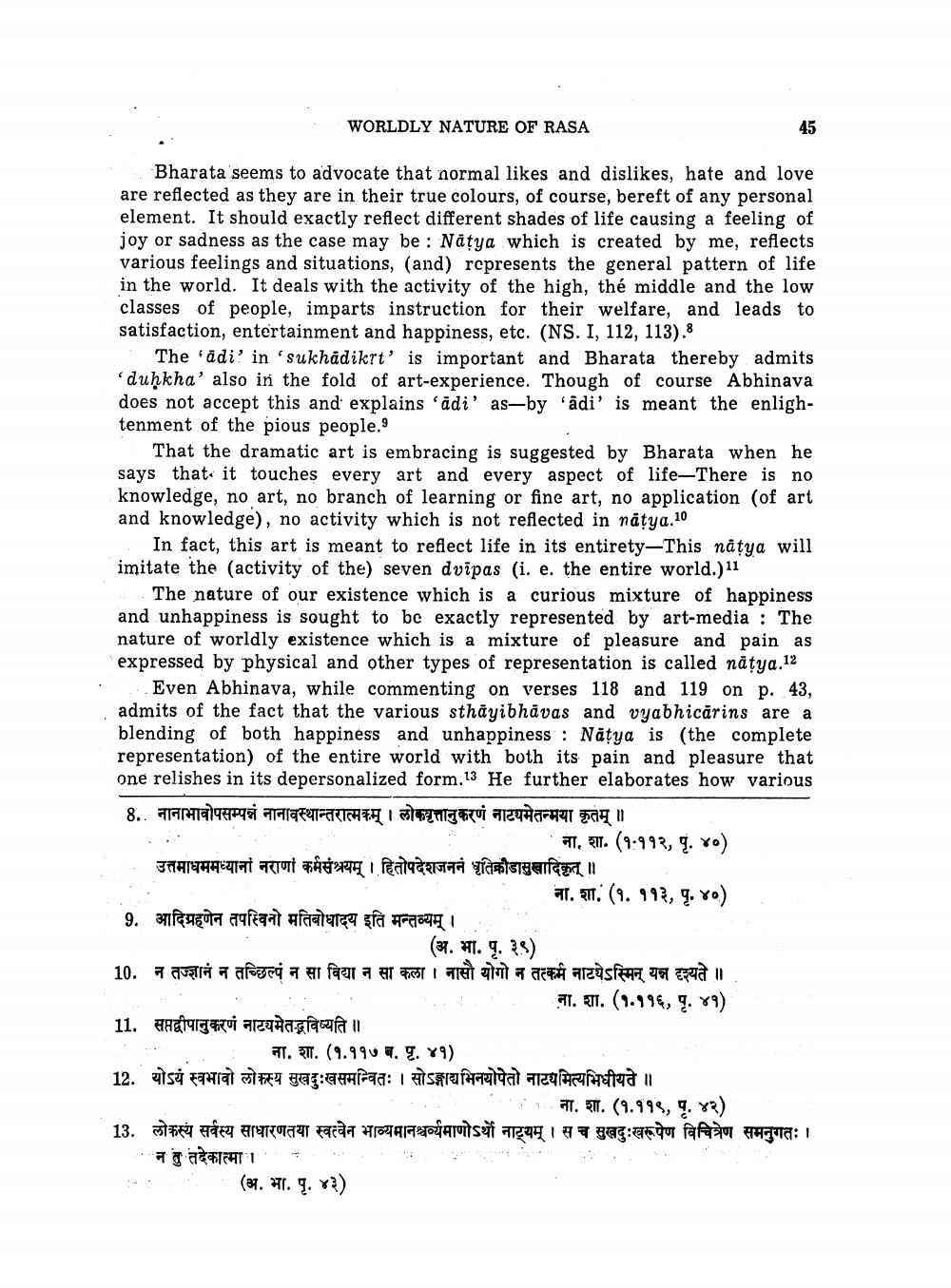________________
WORLDLY NATURE OF RASA
Bharata seems to advocate that normal likes and dislikes, hate and love are reflected as they are in their true colours, of course, bereft of any personal element. It should exactly reflect different shades of life causing a feeling of joy or sadness as the case may be : Nățya which is created by me, reflects various feelings and situations, (and) represents the general pattern of life in the world. It deals with the activity of the high, the middle and the low classes of people, imparts instruction for their welfare, and leads to satisfaction, entertainment and happiness, etc. (NS. I, 112, 113). 8
The 'adi' in 'sukhädikrt' is important and Bharata thereby admits 'duḥkha' also in the fold of art-experience. Though of course Abhinava does not accept this and explains 'adi' as-by adi' is meant the enlightenment of the pious people.9
That the dramatic art is embracing is suggested by Bharata when he says that it touches every art and every aspect of life-There is no knowledge, no art, no branch of learning or fine art, no application (of art and knowledge), no activity which is not reflected in națya.10
In fact, this art is meant to reflect life in its entirety-This nåțya will imitate the activity of the) seven dvipas (i. e. the entire world.) 11
The nature of our existence which is a curious mixture of happiness and unhappiness is sought to be exactly represented by art-media : The nature of worldly existence which is a mixture of pleasure and pain as expressed by physical and other types of representation is called nāțya.12
Even Abhinaya, while commenting on verses 118 and 119 on p. 43, admits of the fact that the various sthayibhävas and vyabhicărins are a blending of both happiness and unhappiness : Natya is (the complete representation) of the entire world with both its pain and pleasure that one relishes in its depersonalized form.13 He further elaborates how various 8.. नानाभावोपसम्पन्नं नानावस्थान्तरात्मकम् । लोकवृत्तानुकरणं नाटयमेतन्मया कृतम् ॥
FT, 311. (9-993, 9. ro) .. उत्तमाधममध्यानो नराणां कर्मसंश्रयम् । हितोपदेशजननं धृतिक्रीडासुखादिकृत् ॥
HT. 31. (9.993, 9. ro) 9. Eta aqfeqat afatete garanti
(27. #1. g. 38) 10. न तज्ज्ञानं न तच्छिल्पं न सा विद्या न सा कला । नासौ योगो न तत्कर्म नाटयेऽस्मिन् यन्न दृश्यते ॥
1. 371. (1.994, . 89) 11. Harg rui arghaslacat
PT. II. (9.990 7. 9. 89) 12. योऽयं स्वभावो लोकस्य सुखदुःखसमन्वितः । सोऽङ्गायभिनयोपेतो नाटयमित्यभिधीयते ॥
DE IT. ITT. (9.993, 9. x2) 13. लोकस्य सर्वस्य साधारणतया स्वत्वेन भाव्यमानश्चय॑माणोऽर्थो नाट्यम् । स च सुखदुःखरूपेण विचित्रेण समनुगतः। S aat CAT 1 -
(27. pr. q. v:)




